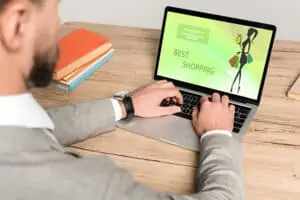Copyright on the Internet: Infringements can be costly
Copyright on the Internet, it's all about: the photo found by chance on the Internet that simply fits perfectly on your own website. The colourful little graphic that makes a wonderful trademark for your new online store.

But be careful! Many, if not most, images and content are protected by copyright.
Read this article to find out exactly how copyright law applies on the Internet, when you are infringing copyright and what legal - and financial - consequences you could face in the worst case.
Inhalt
- What exactly is actually protected by copyright law?
- Copyright on the internet: When and how are copyrights infringed?
- Does copyright apply to all photos on the internet?
- Right of use: How you can use copyrighted works
- What penalties can be imposed for copyright infringements?
1. What exactly is actually protected by copyright law?
Put simply, the Copyright Act (UrhG) protects everything that constitutes an individual, intellectual "creation". Although this definition essentially requires a certain degree of "special originality", case law sets the bar extremely low here.
Specifically, the following fall under the protection of the UrhG: Texts (including e-books and audio books), pieces of music and computer programs, works of visual and dance arts, pantomime works and, of course, photographs and films.
In general, and especially for copyright on the Internet, the following applies: the right to one's own work arises almost automatically at the time of creation. It does not have to be registered or recorded.
2. Copyright on the Internet: When and how are copyrights infringed?
Copyright infringement always occurs when an "intellectual creation" is used without the express consent of the author. The law grants the creator comprehensive exploitation rights to his work, which allow him to prohibit third parties from using it.
The following are regulated in detail:
- Reproduction (§ 16 UrhG): Only the author may decide whether his work is reproduced - in whatever form.
- Distribution (§ 17 UrhG)
- Making available to the public (§ 19a UrhG): Only the creator is responsible for allowing access to his work regardless of time and place.
In terms of copyright on the Internet, this means in practical terms: If, for example, you copy photos from other people's web stores and post them on your own online store page, you are specifically infringing the exploitation rights of the author - namely reproduction and making it available to the public.
3. Does copyright apply to all photos on the internet?
Product photos are not only important for online stores, but also essential for marketplaces such as Amazon, eBay and others. Photos alone can arouse the interest of customers and ensure that they stay on the website.
Nevertheless, the law states that every photo is a copyright-protected work.
Regardless of whether it is a simple image (photograph) or an image with a certain "level of creation", i.e. a special creative and/or artistic aura (photographic work).
If you use product photos without the express permission of the photographer, you are committing a copyright infringement. Exception: If the manufacturer provides you with product data as well as product photos with the note "free for publication" or similar, then you may tacitly assume that the manufacturer has reached an agreement with the photographer regarding utilisation.
Unauthorised use of photos on the Internet is usually punished with a warning. In this case, consult a specialist lawyer for intellectual property rights as soon as possible, who can limit the damage.
4. Right of use: How you can use copyrighted works
If you wish to use works protected by copyright on the Internet for your website or online store, you must acquire the rights to use them.
In practice, these are usually referred to as licences. For photos, you can either use the image databases and stock archives, most of which are subject to a fee, or the free Creative Commons licences.
With CC photos, however, it is essential that you observe the exact conditions and restrictions, as otherwise you may be threatened with expensive warnings.
A note on the use of texts: The German Copyright Act (UrhG) allows you to quote other people's copyrighted texts even without the author's consent - but only to a very limited extent.
Above all, the quotation must have a kind of "documentary function", i.e. it must explain and/or confirm the author's own content.
5. What penalties can be imposed for copyright infringements?
Legislation protects the commitment and creative energy, the time and often also the money that artists, authors and photographers have invested in their works and gives them rights to protect themselves against copyright infringements.
These are divided into
- the right to injunctive relief,
- the claim for removal and
- claim for damages.
If you have infringed copyright on the Internet, you can be issued with a warning.
A warning letter is initially only a formal request from the copyright holder to immediately cease the infringement and not to repeat it in the future. The warning letter is accompanied by a cease-and-desist declaration - as well as a request for payment of damages and legal fees incurred.
As a rule, a very short deadline is set for payment and signing the cease-and-desist declaration.
Never (!) respond to such a warning letter without first consulting a competent specialist lawyer for intellectual property rights. This applies in particular if the warning letter is accompanied by a cease-and-desist declaration with a penalty clause. You risk high contractual penalties.
A qualified specialist lawyer for industrial property protection can modify the cease-and-desist declaration for an infringement of copyright on the Internet in such a way that you do not suffer any long-term negative consequences.
Depending on the individual case, the considerable costs charged can also be reduced. Nevertheless, it makes more sense to find out about copyright on the Internet in good time so that nothing goes wrong in the first place.
Do you have any questions about copyright on the Internet or would you like to make an appointment?
Call (040) 3501 6360 or send an e-mail to info@kanzlei-bennek.de
Picture credits: © IgorVetushko | panthermedia.net



